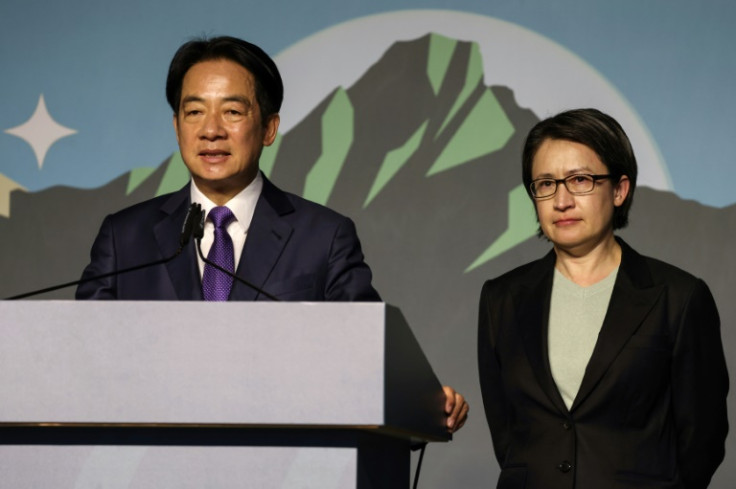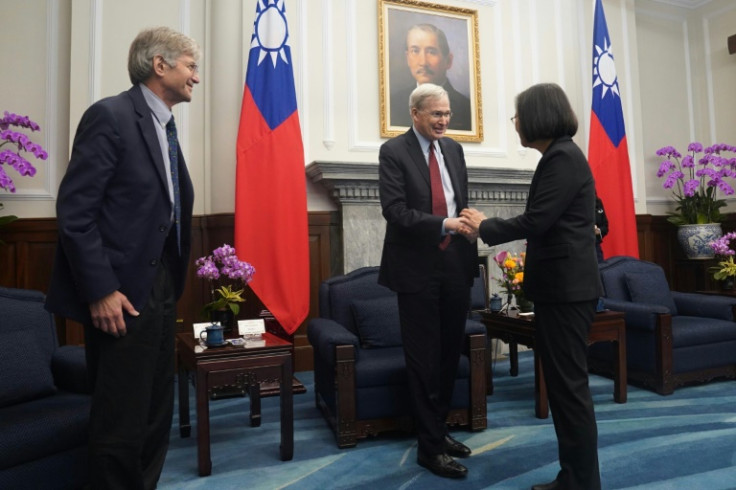
Taiwan's president-elect Lai Ching-te on Monday hailed the island's "solid partnership" with the United States, as he welcomed a delegation from Washington making a post-election visit expected to anger Beijing.
The unofficial delegation was sent by US President Joe Biden's administration to meet senior politicians including current President Tsai Ing-wen and Lai, who won Saturday's poll.
Voters on the self-ruled island defied Beijing's repeated calls not to elect Lai, whom it condemned as a dangerous separatist who would take Taiwan down the "evil path" of independence.
Beijing, which claims the self-ruled island as its territory and has never renounced force to bring it under its control, insisted that the vote did not change the fact the island was part of China.
Lai said Monday that freedom and democracy "are the most valuable assets for the Taiwanese people, and the sacred mountains to protect Taiwan" during his meeting with the delegates at his party's headquarters.
"They are also the core values Taiwan and the United States share and the foundation for the long-term stability in Taiwan-US partnership," he said.
"I am grateful for the strong support from the United States for Taiwan's democracy which demonstrates the close and solid partnership between Taiwan and the United States. It is of great significance to Taiwan."
Before meeting Lai, the delegation went to the Presidential Office to meet with Tsai, who said their visit highlights the "close and staunch" US-Taiwan partnership.
Communist-ruled China vehemently objects to anything that even suggests official recognition of Taiwan, and the US visit is expected to cause annoyance.
The Chinese foreign ministry on Sunday condemned US Secretary of State Antony Blinken for congratulating Lai on his victory.
The delegation consists of a former US national security adviser and a former deputy secretary of state, and was led by the chair of the American Institute of Taiwan -- the de facto US embassy for the island.
Lai, of the ruling Democratic Progressive Party (DPP), had vowed to defend the island from China's "intimidation", and Taipei's foreign ministry told Beijing to accept the result.
He reiterated to the delegates Monday that under his future administration, "Taiwan will continue to defend peace and stability across the Taiwan Strait under the foundation built by President Tsai Ing-wen."
Taiwan is not diplomatically recognised by most countries in the world, though the United States is a partner and its top weapons provider.
The last time a US delegation visited immediately after an election was in 2016, after Tsai's win, to meet her incoming team and the losing candidates.
Since her election, China has cut off all high-level communications with Tsai, as she and her party have defended Taiwan's sovereignty by saying the island is "already independent".
Beijing maintains a military presence around Taiwan, sending in warplanes and naval vessels near-daily -- which conflict experts call "grey zone" actions that stop short of an outright act of war.
But the sabre-rattling has upped worries of possible accidents escalating into full-blown conflict.
Under Tsai's two-term administration, Taiwan has greatly bolstered its defence resources -- buying fighter jets and building its own submarine -- as a form of deterrence against increasingly bellicose threats from China.
Her deputy Lai has vowed to follow the same policy path.
But he has been more outspoken in the past on the issue of independence, though he has moderated his comments to fit the party line in the lead-up to the election.
His win in Saturday's vote delivered an unprecedented third term for the DPP, but they no longer have their majority in the legislature, losing 12 seats, while the main opposition Kuomintang party gained 14 seats.
China's Taiwan Affairs Office said on the heels of the election results that "the Democratic Progressive Party cannot represent the mainstream public opinion on the island", according to the offic8ial Xinhua news agency.








